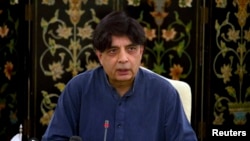ISLAMABAD, PAKISTAN —
Islamist militants in Pakistan, referred to as the Pakistani Taliban, have formally ended a 40-day cease-fire that they called to engage in peace talks with the government. The move has raised fears of renewed suicide bombings and terrorist attacks in the country.
The outlawed Tehreek-i-Taliban Pakistan -- a loose alliance of militant outfits -- began observing the cease-fire on March 1. It expired about a week ago.
The ceasefire led to a reduction in militant violence in the country and facilitated one round of direct talks between government negotiators and Taliban leaders.
Moreover, authorities recently claimed to have released a group of low-level non-combatant Taliban prisoners to further the peace process.
On Wednesday, however, a spokesman for the Pakistani Taliban, Shahidullah Shahid, announced that the group's central leadership has unanimously decided to end the ceasefire, accusing the government of failing to respond positively to Taliban demands.
He insisted the group would be willing to continue the peace process if the government responds positively to its demands.
The militants have been demanding release of non-combatant prisoners and establishment of a so-called “peace zone” where Taliban leaders could move freely while they engage in talks with government negotiators. They also want suspension of military operations against Taliban associates.
Prime Minister Nawaz Sharif has been pursuing peace negotiations rather than ordering fresh army offensives to tackle years of militant violence that has killed thousands of Pakistanis.
Critics question whether it is possible to engage in peace talks with a group that advocates the overthrow of the government and seeks imposition of its brand of Islam in the country by violent means.
Prominent attorney and human rights activist Asma Jahangir said the government’s anti-militancy policy seems to be going nowhere. She questioned the release of so-called non-combatant Taliban prisoners, fearing these men can pose a threat to those involved in bringing them to justice.
“I don’t know how they come to that conclusion that they are non-combatants because all those that they have released have very serious allegations and accusations against them," said Jahangir. "And when these people were arrested, investigated, prosecuted and in some cases even convicted, lawyers, police officers and the judges took risks for their lives in ensuring that justice is given. So, how do you imagine that they [lawyers, police officers and judges] are going to now again put their lives at risk to get people convicted when the government has no straight forward policy.”
Critics oppose peace deals with the Pakistani Taliban, saying the militants resort to such tactics only to gain time to regroup and reorganize their ranks, justas they have done during past agreements.
The outlawed Tehreek-i-Taliban Pakistan -- a loose alliance of militant outfits -- began observing the cease-fire on March 1. It expired about a week ago.
The ceasefire led to a reduction in militant violence in the country and facilitated one round of direct talks between government negotiators and Taliban leaders.
Moreover, authorities recently claimed to have released a group of low-level non-combatant Taliban prisoners to further the peace process.
On Wednesday, however, a spokesman for the Pakistani Taliban, Shahidullah Shahid, announced that the group's central leadership has unanimously decided to end the ceasefire, accusing the government of failing to respond positively to Taliban demands.
He insisted the group would be willing to continue the peace process if the government responds positively to its demands.
The militants have been demanding release of non-combatant prisoners and establishment of a so-called “peace zone” where Taliban leaders could move freely while they engage in talks with government negotiators. They also want suspension of military operations against Taliban associates.
Prime Minister Nawaz Sharif has been pursuing peace negotiations rather than ordering fresh army offensives to tackle years of militant violence that has killed thousands of Pakistanis.
Critics question whether it is possible to engage in peace talks with a group that advocates the overthrow of the government and seeks imposition of its brand of Islam in the country by violent means.
Prominent attorney and human rights activist Asma Jahangir said the government’s anti-militancy policy seems to be going nowhere. She questioned the release of so-called non-combatant Taliban prisoners, fearing these men can pose a threat to those involved in bringing them to justice.
“I don’t know how they come to that conclusion that they are non-combatants because all those that they have released have very serious allegations and accusations against them," said Jahangir. "And when these people were arrested, investigated, prosecuted and in some cases even convicted, lawyers, police officers and the judges took risks for their lives in ensuring that justice is given. So, how do you imagine that they [lawyers, police officers and judges] are going to now again put their lives at risk to get people convicted when the government has no straight forward policy.”
Critics oppose peace deals with the Pakistani Taliban, saying the militants resort to such tactics only to gain time to regroup and reorganize their ranks, justas they have done during past agreements.




